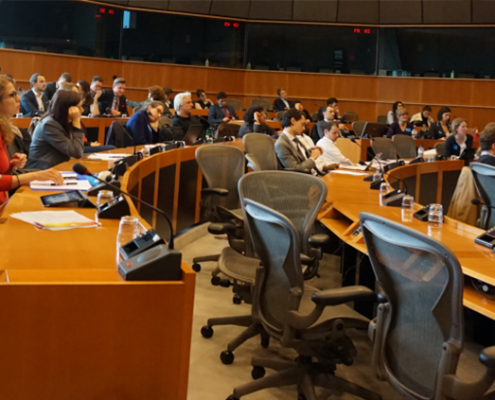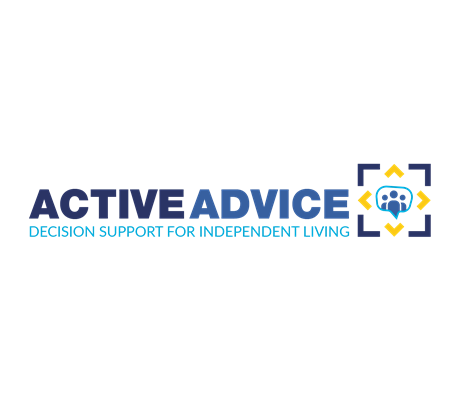Project reference
This project has received funding from the European Union’s H2020 research & innovation programme under Grant Agreement No. 101016247.

This project has received funding from the European Union’s H2020 research & innovation programme under Grant Agreement No. 101016247.
Policymakers and public health experts unanimously recognise the disproportionate impacts of COVID-19 on vulnerable persons: even in countries with well-developed responses, the outbreak and its repercussions imperil the basic well-being of social groups whose livelihoods are already precarious.
Since COVID-19 emerged in December 2019, it has had a nearly unprecedented global social, behavioural and economic impact. The effects of COVID-19 go far beyond physical health, impacting on “everyday life” and well-being, mental health, education, employment, and political stability. Consequently, to fully understand the impact of the pandemic on health outcomes and everyday life, it is important to consider and analyse these different vulnerabilities. As the pandemic has unfolded world-wide, there have been significant differences across European MS in relation to the social and economic impact and the response measures that have been implemented, especially with regard to vulnerable groups. To understand the impact of different measures, there is a need for more comprehensive and coordinated comparative research addressing sub- and supra-national as well as national responses and their impact and unintended consequences. Measures implemented nationally do not impact the entire population equally, with evidence highlighting the disproportionate impacts that the pandemic has had on different segments of society, affecting vulnerable and marginalised groups to a greater extent.
Communication plays a core role in governments’ responses to COVID-19. In the absence of a vaccination or universally accepted treatments, policies are directed towards the national or regional “communication of public health guidance and instructions” (Fakhruddin, Blanchard, & Ragupathy 2020). During a pandemic, it is essential that communication is honest and transparent as confusing or contradictory health messages can increase mistrust and result in people seeking information from unreliable sources (Berger et al. 2020). As vulnerable groups, such as people from Black and Minority Ethnic (BAME), people with disabilities, and undocumented immigrants may already be distrustful of public health institutions (ibid), effective communication is critical to ensure adherence with recommended behaviours. The need for effective communication in response to COVID-19 is heightened by the vast amount of false information and conspiracy theories online. These can result in people being less likely to follow the advice of health officials and instead seek other less effective or fatal treatments (Van Bavel et al. 2020; Boberg et al. 2020).
COVINFORM’s multidisciplinary and intersectional approach will examine how vulnerability is defined and addressed (if at all) in COVID-19 responses from government, public health and communication perspectives. The project will also examine the impact that different national, regional, and local responses have had on vulnerable and marginalised groups, and view these impacts through an intersectionality perspective to understand how different factors interconnect, potentially further increasing vulnerability and marginalisation. COVINFORM will develop solutions, guidelines and recommendations to ensure that the needs of vulnerable and marginalised groups are appropriately considered in potential further waves of COVID-19 and future pandemics.
COVINFORM assess COVID-19 responses and impacts in a multilevel governance framework, focusing on government, public health, and citizen responses and the role of information and communication at all stages of the pandemic. In doing so, it will identify and analyse strategies for inclusive and effective COVID-19 communication, including strategies to influence behaviour change, and a detailed analysis of factors influencing communication practices. The project will identify and assess measures and tools for the prevention of misinformation, disinformation, malinformation, ‘fake news’ and conspiracy theories and analyse and understand the impact of misinformation and digital communication on the mental health and well-being of different groups. The consortium will also research representation and justice in the media in connection with threat perceptions, prejudice, and discrimination. COVINFORM will develop guidance and recommendations for designing effective communication and combating misinformation.
 https://www.synyo.com/wp-content/uploads/SYNYO-NEWS-featured-image-article-AWID-old.png
400
459
SYNYO
https://www.synyo.com/wp-content/uploads/2017/09/synyo-logo.png
SYNYO2019-02-22 12:34:262021-08-10 08:43:56AWID: KIRAS-Project on Prevention of Ideologies of Degradation
https://www.synyo.com/wp-content/uploads/SYNYO-NEWS-featured-image-article-AWID-old.png
400
459
SYNYO
https://www.synyo.com/wp-content/uploads/2017/09/synyo-logo.png
SYNYO2019-02-22 12:34:262021-08-10 08:43:56AWID: KIRAS-Project on Prevention of Ideologies of Degradation https://www.synyo.com/wp-content/uploads/SYNYO-NEWS-featured-image-active-advice-article-old.png
400
459
SYNYO
https://www.synyo.com/wp-content/uploads/2017/09/synyo-logo.png
SYNYO2018-11-30 07:18:332021-08-10 08:46:41ActiveAdvice: Decision support with a network of authorised active advisors and a digital platform
https://www.synyo.com/wp-content/uploads/SYNYO-NEWS-featured-image-active-advice-article-old.png
400
459
SYNYO
https://www.synyo.com/wp-content/uploads/2017/09/synyo-logo.png
SYNYO2018-11-30 07:18:332021-08-10 08:46:41ActiveAdvice: Decision support with a network of authorised active advisors and a digital platform https://www.synyo.com/wp-content/uploads/2018/03/ActiveAdvice-04.png
423
900
SYNYO
https://www.synyo.com/wp-content/uploads/2017/09/synyo-logo.png
SYNYO2018-03-01 15:29:142018-03-01 15:33:08ActiveAdvice Results of End-User Tests
https://www.synyo.com/wp-content/uploads/2018/03/ActiveAdvice-04.png
423
900
SYNYO
https://www.synyo.com/wp-content/uploads/2017/09/synyo-logo.png
SYNYO2018-03-01 15:29:142018-03-01 15:33:08ActiveAdvice Results of End-User Tests https://www.synyo.com/wp-content/uploads/2017/04/AAL2B1.png
423
900
SYNYO
https://www.synyo.com/wp-content/uploads/2017/09/synyo-logo.png
SYNYO2017-04-11 15:19:132017-05-18 11:41:03Developing the ActiveAdvice Information & Awareness Hub
https://www.synyo.com/wp-content/uploads/2017/04/AAL2B1.png
423
900
SYNYO
https://www.synyo.com/wp-content/uploads/2017/09/synyo-logo.png
SYNYO2017-04-11 15:19:132017-05-18 11:41:03Developing the ActiveAdvice Information & Awareness Hub https://www.synyo.com/wp-content/uploads/2017/05/ftdm-ep-1-900x423.png
423
900
SYNYO
https://www.synyo.com/wp-content/uploads/2017/09/synyo-logo.png
SYNYO2017-04-03 15:17:462020-12-17 12:40:24Second Workshop. FutureTDM in Brussels
https://www.synyo.com/wp-content/uploads/2017/05/ftdm-ep-1-900x423.png
423
900
SYNYO
https://www.synyo.com/wp-content/uploads/2017/09/synyo-logo.png
SYNYO2017-04-03 15:17:462020-12-17 12:40:24Second Workshop. FutureTDM in Brussels https://www.synyo.com/wp-content/uploads/2017/02/ActiveAdvice-03.png
423
900
SYNYO
https://www.synyo.com/wp-content/uploads/2017/09/synyo-logo.png
SYNYO2016-11-17 10:10:592017-02-17 10:19:14Structuring the Stakeholder Landscape
https://www.synyo.com/wp-content/uploads/2017/02/ActiveAdvice-03.png
423
900
SYNYO
https://www.synyo.com/wp-content/uploads/2017/09/synyo-logo.png
SYNYO2016-11-17 10:10:592017-02-17 10:19:14Structuring the Stakeholder Landscape https://www.synyo.com/wp-content/uploads/2017/02/FutureTDM-05.png
423
900
SYNYO
https://www.synyo.com/wp-content/uploads/2017/09/synyo-logo.png
SYNYO2016-11-17 08:44:082017-02-17 08:56:58FutureTDM Workshop
https://www.synyo.com/wp-content/uploads/2017/02/FutureTDM-05.png
423
900
SYNYO
https://www.synyo.com/wp-content/uploads/2017/09/synyo-logo.png
SYNYO2016-11-17 08:44:082017-02-17 08:56:58FutureTDM Workshop https://www.synyo.com/wp-content/uploads/2016/09/Banner-article-01.png
423
900
SYNYO
https://www.synyo.com/wp-content/uploads/2017/09/synyo-logo.png
SYNYO2016-09-29 07:53:482017-06-14 07:25:50TDM in the space industry
https://www.synyo.com/wp-content/uploads/2016/09/Banner-article-01.png
423
900
SYNYO
https://www.synyo.com/wp-content/uploads/2017/09/synyo-logo.png
SYNYO2016-09-29 07:53:482017-06-14 07:25:50TDM in the space industry https://www.synyo.com/wp-content/uploads/2017/02/FutureTDM-04.png
423
900
SYNYO
https://www.synyo.com/wp-content/uploads/2017/09/synyo-logo.png
SYNYO2016-08-17 08:31:352017-04-13 09:01:57Actively Blogging on FutureTDM Platform
https://www.synyo.com/wp-content/uploads/2017/02/FutureTDM-04.png
423
900
SYNYO
https://www.synyo.com/wp-content/uploads/2017/09/synyo-logo.png
SYNYO2016-08-17 08:31:352017-04-13 09:01:57Actively Blogging on FutureTDM Platform https://www.synyo.com/wp-content/uploads/2016/09/ActiveAdvice-02.png
423
900
SYNYO
https://www.synyo.com/wp-content/uploads/2017/09/synyo-logo.png
SYNYO2016-08-04 12:58:582016-12-20 13:39:34Studying AAL User Information Needs
https://www.synyo.com/wp-content/uploads/2016/09/ActiveAdvice-02.png
423
900
SYNYO
https://www.synyo.com/wp-content/uploads/2017/09/synyo-logo.png
SYNYO2016-08-04 12:58:582016-12-20 13:39:34Studying AAL User Information Needs https://www.synyo.com/wp-content/uploads/2017/02/FutureTDM-03.png
423
900
SYNYO
https://www.synyo.com/wp-content/uploads/2017/09/synyo-logo.png
SYNYO2016-07-17 08:14:382017-04-13 09:02:18Recent dissemination events
https://www.synyo.com/wp-content/uploads/2017/02/FutureTDM-03.png
423
900
SYNYO
https://www.synyo.com/wp-content/uploads/2017/09/synyo-logo.png
SYNYO2016-07-17 08:14:382017-04-13 09:02:18Recent dissemination events https://www.synyo.com/wp-content/uploads/2016/09/ActiveAdvice-01.png
423
900
SYNYO
https://www.synyo.com/wp-content/uploads/2017/09/synyo-logo.png
SYNYO2016-05-18 12:55:192020-12-17 12:41:16A novel Cloud of AAL Products and Services
https://www.synyo.com/wp-content/uploads/2016/09/ActiveAdvice-01.png
423
900
SYNYO
https://www.synyo.com/wp-content/uploads/2017/09/synyo-logo.png
SYNYO2016-05-18 12:55:192020-12-17 12:41:16A novel Cloud of AAL Products and Services https://www.synyo.com/wp-content/uploads/2017/02/FutureTDM-02.png
423
900
SYNYO
https://www.synyo.com/wp-content/uploads/2017/09/synyo-logo.png
SYNYO2016-05-16 16:48:492017-04-13 09:02:36Project meetings with a special guest
https://www.synyo.com/wp-content/uploads/2017/02/FutureTDM-02.png
423
900
SYNYO
https://www.synyo.com/wp-content/uploads/2017/09/synyo-logo.png
SYNYO2016-05-16 16:48:492017-04-13 09:02:36Project meetings with a special guest https://www.synyo.com/wp-content/uploads/SYNYO-NEWS-featured-image-NEW01001801EN.png
400
459
SYNYO
https://www.synyo.com/wp-content/uploads/2017/09/synyo-logo.png
SYNYO2016-04-13 15:46:072021-02-03 09:04:02ActiveAdvice: Decision-support in the search for smart solutions supporting independent living
https://www.synyo.com/wp-content/uploads/SYNYO-NEWS-featured-image-NEW01001801EN.png
400
459
SYNYO
https://www.synyo.com/wp-content/uploads/2017/09/synyo-logo.png
SYNYO2016-04-13 15:46:072021-02-03 09:04:02ActiveAdvice: Decision-support in the search for smart solutions supporting independent living https://www.synyo.com/wp-content/uploads/2017/02/FutureTDM-01.png
423
900
SYNYO
https://www.synyo.com/wp-content/uploads/2017/09/synyo-logo.png
SYNYO2016-02-16 16:04:172020-12-17 12:41:37FutureTDM Communication Channels
https://www.synyo.com/wp-content/uploads/2017/02/FutureTDM-01.png
423
900
SYNYO
https://www.synyo.com/wp-content/uploads/2017/09/synyo-logo.png
SYNYO2016-02-16 16:04:172020-12-17 12:41:37FutureTDM Communication Channels
 UNCOVER
UNCOVER | Cookie | Duration | Description |
|---|---|---|
| cookielawinfo-checkbox-analytics | 11 months | This cookie is set by GDPR Cookie Consent plugin. The cookie is used to store the user consent for the cookies in the category "Analytics". |
| cookielawinfo-checkbox-functional | 11 months | The cookie is set by GDPR cookie consent to record the user consent for the cookies in the category "Functional". |
| cookielawinfo-checkbox-necessary | 11 months | This cookie is set by GDPR Cookie Consent plugin. The cookies is used to store the user consent for the cookies in the category "Necessary". |
| cookielawinfo-checkbox-others | 11 months | This cookie is set by GDPR Cookie Consent plugin. The cookie is used to store the user consent for the cookies in the category "Other. |
| cookielawinfo-checkbox-performance | 11 months | This cookie is set by GDPR Cookie Consent plugin. The cookie is used to store the user consent for the cookies in the category "Performance". |
| viewed_cookie_policy | 11 months | The cookie is set by the GDPR Cookie Consent plugin and is used to store whether or not user has consented to the use of cookies. It does not store any personal data. |

ATHOC-19
/0 Comments/in ATHOC-19, Projects /by SYNYOA project for the development of end-to-end platform for remote monitoring of COVID-19 patients
AAL.Vision
/0 Comments/in AALVision, Projects /by SYNYOUnderstand the Dimenstions of Organised Crime and Terrorist Networks for Developing Effective and Efficient Security Solutions for First-line-practitioners and Professionals
Active Advice
/0 Comments/in ActiveAdvice, Projects /by SYNYODecision Support Solutions for Independent Living using an Intelligent AAL Product and Service Cloud